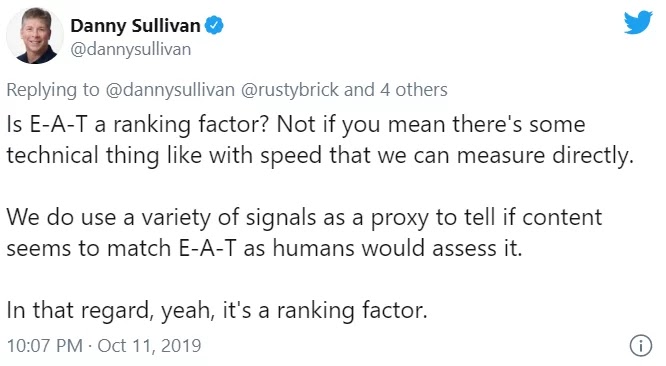
E-A-T began to be discussed a few years ago and has been mentioned in hundreds of SEO articles to date. Some article sources state that E-A-T is included in Google’s ranking factor, while other articles say otherwise. So which one is correct?
{jistoc} $title={Table of Contents}
What is E-A-T?
E-A-T stands for Expertise, Authoritativeness, and Trustworthiness. This term first appeared in Google’s Search Quality Rater Guidelines — a document that serves as a reference for human search quality raters to assess the quality of Google search results.
Google Quality Rater is a collection of people assigned to assess the feasibility and relevance of a website for certain keywords. They become one of the variables for Google in improving the Google algorithm from the user’s point of view.
Google published this document online in 2013 to help webmasters understand what Google wants for a web page.
How important is E-A-T?
The answers to these questions will depend on the type of queries entered. E-A-T becomes less important when the topic of content is something subjective. For example, in an image search with the keywords ‘cute cat’, ‘beautiful plant’, and so on.
On the other hand, if you are looking for information on dosing, financial tips, or other important topics, then E-A-T is very important.
These topics are referred to as YMYL (Your Money or Your Life) topics by Google. Broadly speaking, YMYL topics are topics or pages whose contents can affect a person’s happiness, health, financial stability, or security in the future.
If your site touches on the topic of YMYL, then optimizing for Google E-A-T is a must.
How to measure E-A-T?
Although they seem similar, Expertise, Authoritativeness, and Trustworthiness are three different concepts. Each of the three concepts has different evaluation criteria. Below is the description.
Expertise
Expertise referred to in this context is having high knowledge or expertise in a specific field. Mainly, the expertise aspect is evaluated at the content level, not at the entire website. In other words, Google will prioritize content created by people who are experts in their fields.
For YMYL topics, the assessment will be based on formal skills, qualifications, and the educational track and experience of the content creator. For example, an accountant will be more qualified in creating content about taxation compared to a layman.
As for non-YMYL topics, expertise will be assessed from the demonstration of relevant life experiences or what is known as ‘everyday expertise’.
Authoritativeness
Authoritativeness concerns the reputation of a website or content creator among experts and influencers in a particular industry. Simply put, a website or content creator will have high authority when the website or content creator is used as the main source for searching for information on a particular topic.
To evaluate the level of authority, raters will explore a site to get information about the reputation of the site, including reviews, recommendations, articles, or other credible sources.
Trustworthiness
Trustworthiness concerns the legitimacy, transparency, and accuracy of a website or content. Raters will look at several aspects of evaluating trustworthiness such as contact information, or a statement of liability for the publication of content.
Raters will also assess the level of accuracy of the information listed on a page or content. That way, citing references and embedding external links are important things to do.
Is E-A-T a Google ranking factor?
In answering the question, Danny Sullivan, Public Liaison of Search at Google stated that:

It can be concluded from the tweet that in order to become a ranking factor, something must have a clear quantitative value so that it can be understood and evaluated by the computer. The number of backlinks from a website is one concrete example.
Google can crawl a website to count the number of backlinks it has. From the crawl results, the ranking of search results will then be determined with websites that have quality backlinks occupying the top order.
However, this is not the case with expertise, authoritativeness, and trustworthiness which are human concepts so that they are difficult to standardly evaluate by a computer.
In solving these problems, Google implemented the following solutions:
First, Google’s Search Engineers designed algorithm changes aimed at improving the quality of search results.
Second, Quality Raters compare the search results with the application of the new algorithm and the search results without the application of the new algorithm. The results of the comparison will be accepted by Google as feedback from the search results.
Third, Google uses feedback from Quality Raters to determine whether a proposed algorithm change has a positive or negative impact on search results. Algorithm changes will be implemented if they have a positive impact.
Conclusion
From the explanation above, it can be concluded that Google E-A-T is an important factor to consider for your SEO efforts, especially if your website touches on YMYL topics.
Although there is no explicit advice on how to optimize E-A-T for a website, Google’s Vice President of Search, Ben Gomes, suggests referring to the rater guidelines to understand what Google wants a website to rank for in search results.
Thus the review about the new signal ranking from Google is important for you to know.